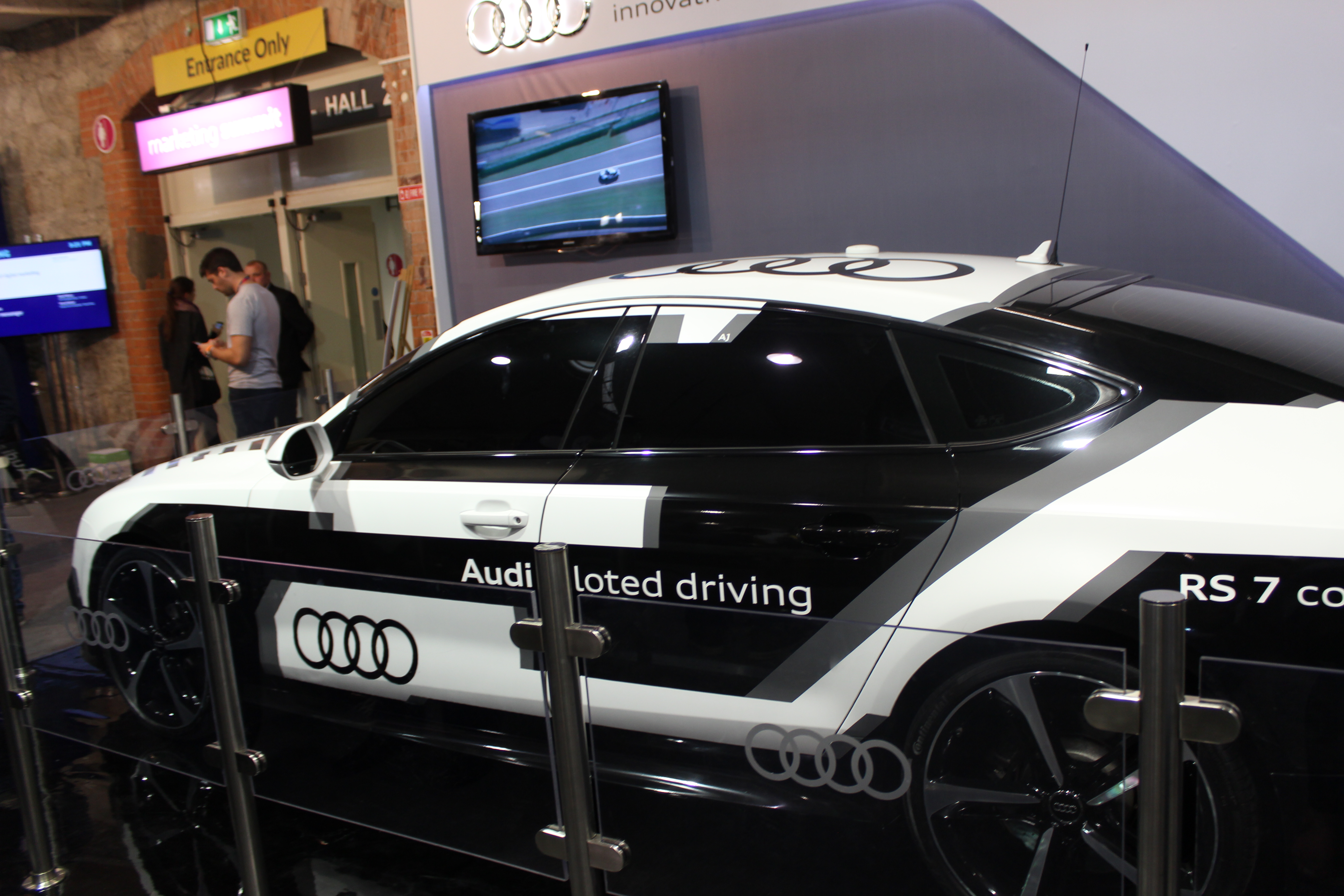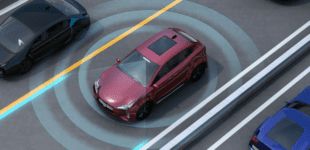November 4, 2015
Walking the floor of the Royal Dublin Society (RDS) arena where Web Summit is held, it’s hard not to notice the Audi kiosk, complete with a VR demo and a model of their RS7 prototype. Those who were interested in learning more about Audi’s intelligent transportation intentions were treated to a keynote from Sven Schuwirth, Audi’s Head of Brand Development and Digitalization at the Machine Stage.
Schuwirth delivered his keynote with a passionate emphasis on the future of the automotive industry, and the overarching impacts that intelligent transportation will have on life itself. The keynote started with the facts, pointing out plain and simple that autonomy is the future. Schuwirth shared that by 2030, it’s expected that the industry will be fully autonomous.
Audi and autonomy continue to become a natural association. The company’s first foray into the field was with a prototype called Shelley that they tested back in 2009. Shelley was later followed by James (Nevada) in 2012 and Bobby (Germany). Most recently, the automaker debuted Jack, an A7, at CES 2015. Jack was part of an A7 fleet that journeyed from from California to Nevada, fully autonomously, for the conference.

As tests continue on roads and racetracks, Audi is doing its due diligence to educate consumers on the many benefits of driverless cars, starting with safety. Like many other automakers, they champion the fact that cars continue to outperform drivers, with 90% of all accidents being human error.
In addition to sharing the safety benefits, Schuwirth went on to explain how an autonomous vehicle should be considered an attainable luxury. He used New York as an example to share how the broader transport industry – taxis, for example – could be revolutionized with safer rides and shorter wait times.
Schuwirth’s passion for autonomy was infectious — he skillfully likened the time saved from driverless innovation to a simple comfort, time that could instead be used to rest, communicate and consume media, or work. Ultimately, he reasoned that driverless cars will shape behavior, improving overall productivity as they continue to be implemented into our ecosystem of connected things.
Wrapping up his keynote with almost a meditative-like prose, Schuwirth left the audience with the a glimmer of hope. Hardcore auto enthusiast or not, we were left to wonder about the potential serenity of intelligent transportation, that extra hour of peaceful solitude where your car is your castle, and the roads are your kingdom.





 Meaningful Momentum or Running in Place?
Meaningful Momentum or Running in Place? AI Through Our Ages
AI Through Our Ages Liquid Infrastructure: Our Planet's Most Precious Resource
Liquid Infrastructure: Our Planet's Most Precious Resource The Impact of Technology in 2025
The Impact of Technology in 2025 Quantum and AI: Safeguards or Threats to Cybersecurity?
Quantum and AI: Safeguards or Threats to Cybersecurity? Why AI Can't Live Without Us
Why AI Can't Live Without Us Bits, Bytes, Buildings and Bridges: Digital-Driven Infrastructure
Bits, Bytes, Buildings and Bridges: Digital-Driven Infrastructure Impact of Technology in 2024
Impact of Technology in 2024 Emerging AI Cybersecurity Challenges and Solutions
Emerging AI Cybersecurity Challenges and Solutions The Skies are Unlimited
The Skies are Unlimited Smart Cities 2030: How Tech is Reshaping Urbanscapes
Smart Cities 2030: How Tech is Reshaping Urbanscapes Impact of Technology 2023
Impact of Technology 2023 Cybersecurity for Life-Changing Innovations
Cybersecurity for Life-Changing Innovations Smarter Wearables Healthier Life
Smarter Wearables Healthier Life Infrastructure In Motion
Infrastructure In Motion The Impact of Tech in 2022 and Beyond
The Impact of Tech in 2022 and Beyond Cybersecurity, Technology and Protecting Our World
Cybersecurity, Technology and Protecting Our World How Technology Helps us Understand Our Health and Wellness
How Technology Helps us Understand Our Health and Wellness The Resilience of Humanity
The Resilience of Humanity Harnessing and Sustaining our Natural Resources
Harnessing and Sustaining our Natural Resources Creating Healthy Spaces Through Technology
Creating Healthy Spaces Through Technology Exceptional Infrastructure Challenges, Technology and Humanity
Exceptional Infrastructure Challenges, Technology and Humanity The Global Impact of IEEE's 802 Standards
The Global Impact of IEEE's 802 Standards Scenes of our Cyber Lives: The Security Threats and Technology Solutions Protecting Us
Scenes of our Cyber Lives: The Security Threats and Technology Solutions Protecting Us How Millennial Parents are Embracing Health and Wellness Technologies for Their Generation Alpha Kids
How Millennial Parents are Embracing Health and Wellness Technologies for Their Generation Alpha Kids Space Exploration, Technology and Our Lives
Space Exploration, Technology and Our Lives Global Innovation and the Environment
Global Innovation and the Environment How Technology, Privacy and Security are Changing Each Other (And Us)
How Technology, Privacy and Security are Changing Each Other (And Us) Find us in booth 31506, LVCC South Hall 3 and experience the Technology Moon Walk
Find us in booth 31506, LVCC South Hall 3 and experience the Technology Moon Walk Virtual and Mixed Reality
Virtual and Mixed Reality How Robots are Improving our Health
How Robots are Improving our Health IEEE Experts and the Robots They are Teaching
IEEE Experts and the Robots They are Teaching See how millennial parents around the world see AI impacting the lives of their tech-infused offspring
See how millennial parents around the world see AI impacting the lives of their tech-infused offspring Take the journey from farm to table and learn how IoT will help us reach the rising demand for food production
Take the journey from farm to table and learn how IoT will help us reach the rising demand for food production Watch technical experts discuss the latest cyber threats
Watch technical experts discuss the latest cyber threats Explore how researchers, teachers, explorers, healthcare and medical professionals use immersive technologies
Explore how researchers, teachers, explorers, healthcare and medical professionals use immersive technologies Follow the timeline to see how Generation AI will be impacted by technology
Follow the timeline to see how Generation AI will be impacted by technology Learn how your IoT data can be used by experiencing a day in a connected life
Learn how your IoT data can be used by experiencing a day in a connected life Listen to technical experts discuss the biggest security threats today
Listen to technical experts discuss the biggest security threats today See how tech has influenced and evolved with the Games
See how tech has influenced and evolved with the Games Enter our virtual home to explore the IoT (Internet of Things) technologies
Enter our virtual home to explore the IoT (Internet of Things) technologies Explore an interactive map showcasing exciting innovations in robotics
Explore an interactive map showcasing exciting innovations in robotics Interactively explore A.I. in recent Hollywood movies
Interactively explore A.I. in recent Hollywood movies Get immersed in technologies that will improve patients' lives
Get immersed in technologies that will improve patients' lives